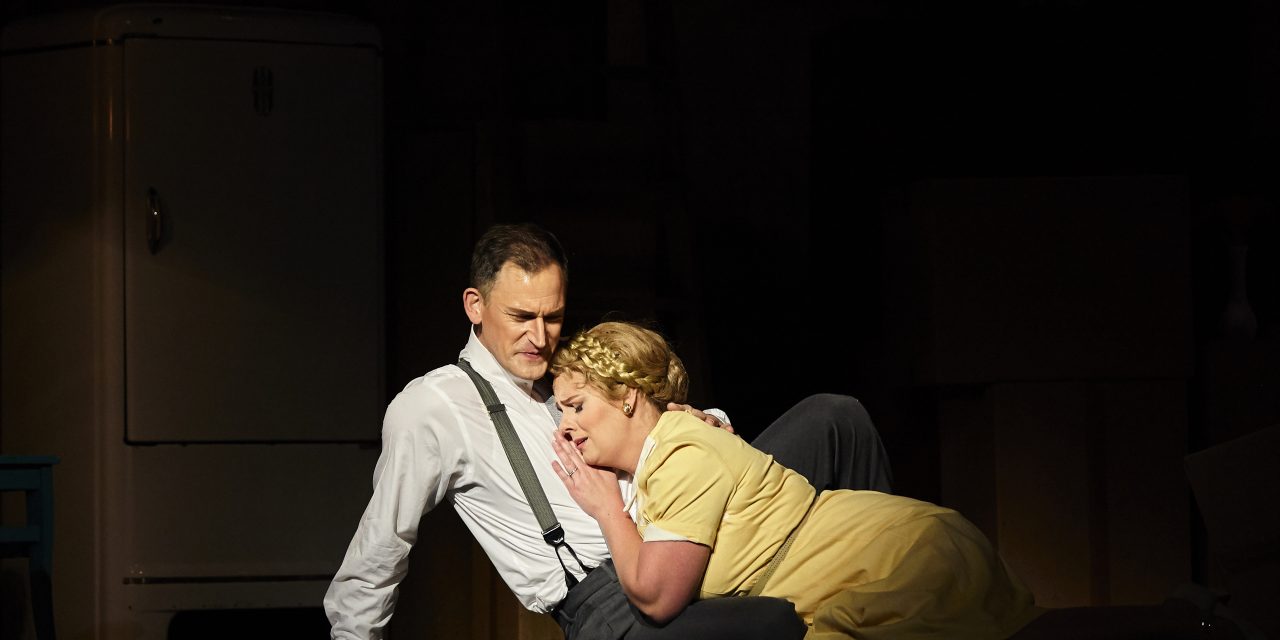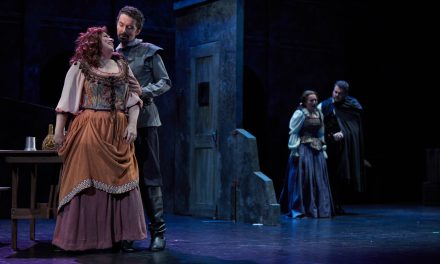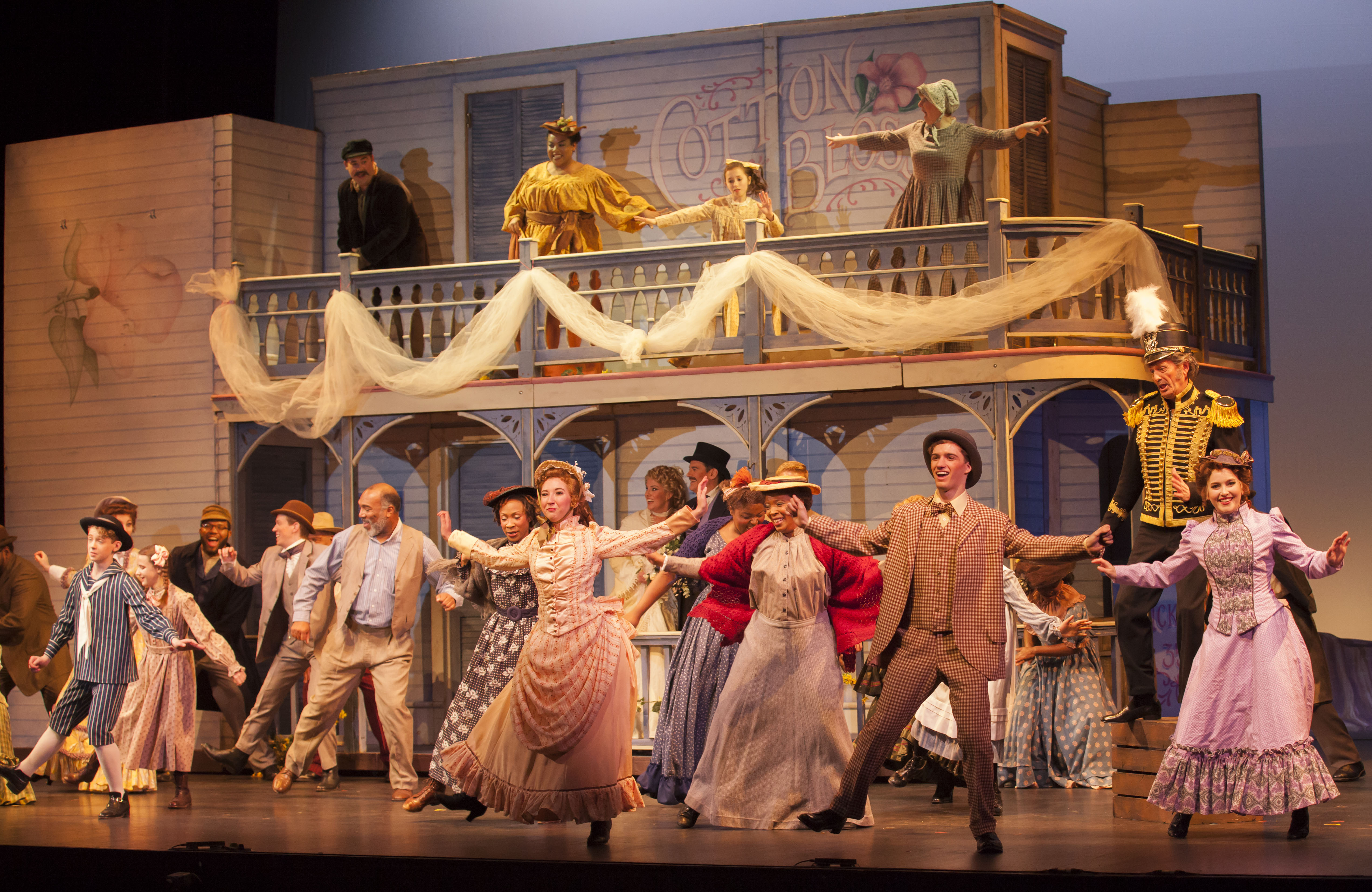Morgan Smith & Emily Albrink. Photo: Bill Brymer
Enemies, A Love Story
Music by Ben Moore
Libretto by Nahma Sandrow
Book by Isaac Bashevis Singer
Conducted by David Stern
Directed by Mary Birnbaum
Review by Annette Skaggs
Entire contents are copyright © 2018 Annette Skaggs. All rights reserved
Can a person escape unimaginable tragedy and horrors and rebuild his/her broken life? Can it be done without complication, without compromise? What does one do when ghosts from the past materialize and cause confusion and stir deeply rooted emotions? How does one resolve the new mess that has been created because of lust and love? These are some of the central questions that come into play in Ben Moore’s opera Enemies, A Love Story.
Herman Broder (Morgan Smith) has escaped the horrific concentration camps of World War II by hiding in a hayloft owned by a Polish farmer. After several years of hiding, Herman marries the farmer’s daughter Yadwiga (Emily Albrink) and the two make their way to New York to begin a new life. While Yadwiga takes care of their small apartment, Herman is always on the road selling books, or so he tells his simple wife. In fact, Herman is dating Masha (Danielle Pastin), a beautiful and fiery survivor of the camps as well. While at breakfast at Masha’s house Herman sees his name mentioned in the personal ads of the paper which leads him to another part of New York whereupon he comes face to face with his first wife, Tamara (Catherine Martin), who was reported to be a victim of the camps, along with their two children.
After a heart to heart conversation, Tamara offers to divorce Herman so that he can pursue the life he has with Yadwiga and Masha, but his feelings for Tamara prevent him for doing so. Despite not saying definitively she knows about her husband affair, Yadwiga defends Herman and longs for him to be home and become a family. Meanwhile, Masha prods Herman even more for marriage and the two are married at the Bronx Zoo. After a passionate night, Herman’s guilt overtakes him and he returns to Yadwiga with a sense of being a better husband and devoted father, leaving Masha in the dark.
Yadwiga becomes pregnant and Tamara comes to defend and befriend the young girl, but Herman’s fidelity doesn’t last long as Masha’s siren song has quickly lured him back into her arms. Guilt-ridden, Herman turns to his employer, Rabbi Lampert (Levi Hernandez), for whom he writes speeches, for spiritual and moral guidance. Does the Rabbi soothe Herman’s heart and free his soul? Does he choose among his three wives?
Admittedly, I am not a big fan of contemporary opera. But when great operas like Carmen and Le Nozze di Figaro were first introduced, they were contemporary. A fair point to be sure, but musical styles and writing have changed over the centuries and sometimes those changes are good and others, not so much. So, I approach contemporary operas (well, anything really) with an open ear and mind. I am certainly going to chalk Enemies, A Love Story in the win column.
While the story is a bit on the soap opera-ish side, it isn’t too far removed from other operatic themes; therefore it fits quite nicely in the operatic canon. Throughout there are moments of delight (“Miracles”), lamentations of wishes, dreams and fulfillment (“Yadwiga’s Aria”, “Prayer”) and absolute heart-wrenching sadness and sympathy (“Tamara’s Aria”).
Ben Moore (and Nahma Sandrow) takes careful consideration of the musical heritage of these characters and incorporates these sounds within the whole of the score, borrowing from long-treasured songs of prayer and honor such as the wedding song “A Woman of Valor” to religious verses contained within the Song of Songs. He is also generous with a Klezmer influence and brilliant use of the woodwinds, commonly found in Jewish music. All of which is to say that while I didn’t walk away with a melody stuck in my head, I did find the piece to be absolutely in emotional sync with what was being performed on stage. Not to mention that our Louisville Orchestra, under the baton of guest conductor David Stern, performed marvelously.
As far as the talent upon the stage, this was one of the strongest groups of vocalists that I’ve heard at The Brown Theatre recently. Despite having little to sing, Elizabeth Batton’s Shrifah Puah, Masha’s mother, brought forth a mother’s lamentation of her lost years and fear of her future with character and sympathy. Levi Hernandez as Rabbi Lampert was a pleasant surprise. New to the Kentucky Opera stage as were some others, I found his tenor to be well-rounded and inviting. However, I noticed that the scoring in the vocal range for the Rabbi wasn’t very large, so, I would have loved to have heard a little more of what Mr. Hernandez could have done.
For those of us that have been following her career, I was very happy to see Emily Albrink as Yadwiga. Her dewy features and vocal prowess made her a great choice for the role. She was able to draw the audience into her plight and root for her to be able to have the family life she’d always dreamed about. Despite having a little breath control issue within her last aria I felt Ms. Albrink fully enveloped who Yadwiga was and could be.
In reading some of Danielle Pastin’s biography and hearing her as Masha in Enemies, A Love Story, I can see that she is a star on the rise. While her role seemed a bit demure and held back within the first half of Enemies, it was the second act that she proverbially let it all out. Her pleas to her new husband were raw and emotional as well as vocally athletic. Unfortunately, there were a couple of times that, because of staging, it was difficult to hear Ms. Pastin, especially in her lower range. And speaking of vocal dexterity, it was wonderful to have Morgan Smith return to the Kentucky Opera stage as Herman. When last in Louisville he was the condemned Joseph in Jake Heggie’s Dead Man Walking. I dare say that Mr. Smith may have improved even more in that short amount of time. Very rarely did I hear his voice waiver from a full powerhouse baritone, even as he was lying down, he could always be heard. Not to mention that he has the kind of voice that one can sink their teeth into.
My favorite performance of the evening was Catherine Martin’s Tamara. Ms. Martin’s Mezzo timbre had me on several points of the emotional scale. She was biting when fussing at her husband, tender when helping Yadwiga and heart-wrenching when she spoke of her children. I dare say that there were some tears coming down a few faces within that soulful aria.
Director Mary Birnbaum certainly brought a unique vision for the staging. By incorporating cardboard and corrugated boxes stacked on shelves and scattered around the stage, these props could transform the stage into four different locations simply by moving a box to its side or to the floor or turning it to reveal a picture or advertisement. While these scene changes were often done by supernumeraries and/or the small chorus, I often found it a bit clumsy. There was more than one time that boxes landed on the moving team or the prop wasn’t placed in the proper place to make sense for the scene. Also, while the use of lights, lamps, and a small train was very clever to use to indicate a time and/or place, other props could not be seen by everyone in the audience (including myself). For example, I would love to have seen the children’s mementos that were so lovingly held up by Tamara, but they were on the smallish side, so I couldn’t tell.
While I mostly enjoyed the staging as it was appropriate for the size of the stage and scene, there was one scene that I found to be rather sloppy: the canopy at the Bronx Zoo. While I absolutely loved the use of puppets and dolls for the animals, the chorus part in the rising of the canopy seemed rushed and unsure, as was the dancing afterward. Also, is there a reason why Tamara was wearing the same dress from Act I into the beginning of Act II?
Despite those few hiccups, I will admit that I’d be happy to have a return of this opera within the performance cycle in the next five to ten years.
Thank you to Barbara Lynne Jamison for recognizing the hard workers that make up the I.A.T.S.E., for they are the backbone to be able to produce these magnificent stage performances. Also, deepest appreciation for reminding us that the weekend marked the 80th anniversary of Kristallnacht, commonly referred to as the beginning of the Holocaust. May the world never see these events happen again.
Mazel Tov!!!
Enemies, A Love Story
November 9 & 11, 2018
Kentucky Opera
W. L. Lyons Brown Theater
315 W. Broadway
Louisville, Kentucky 40202
kyopera.org
Annette Skaggs is heavily involved as an Arts Advocate here in Louisville. She is a freelance professional opera singer who has performed throughout Europe and in St. Louis, Cincinnati, Boulder, Little Rock, Peoria, Chicago, New York and of course Louisville. Aside from her singing career, she has been a production assistant for Kentucky Opera, New York City Opera, and Northwestern University. Her knowledge and expertise have developed over the course of 25+ years’ experience in the classical arts.





